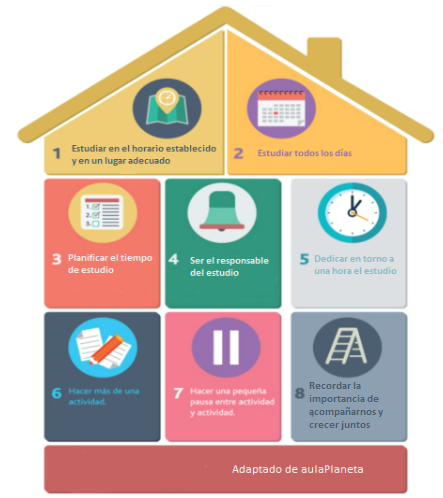
“It is time to sit down together and continue promoting
the autonomy of children and adolescents through the example that will allow
that the atmosphere at home becomes easier to bear.»
The challenge of finding the goal together
Many families have chosen homeschooling or “schooling” over the last few years.Homeschooling”, understood as “a commitment by parents to personally educate their children from within the context of their homes. It is an education founded on the family nucleus, directed by the parents most of the time, or by the children or adolescents, and strengthens the individualization of each student. In homeschooling, the correct strategy is selected for each student, encouraging learning, motivation to learn, soft skills, values for life, and the development of traits that allow the construction of the person.”. (Lines, 1998; Ray, 1999).
In our case, we know that this situation is far from a family decision, and becomes more of a learning option for their children, imposed by the world situation that greatly exceeds us. This is why we want to emphasize some of the characteristics of the model of homeschooling that can benefit their children, and why not, families collaterally.
We want to propose it as an opportunity for each of the children to take responsibility for their tasks and commitments, and where each member of the family can share the work table, dedicating themselves to the tasks that are their responsibility: the adults to their work responsibilities and the children to their schoolwork. It is time to sit down together and continue promoting the autonomy of children and adolescents through the example that will allow the atmosphere at home to be easier to bear. Certainly within the School population, we have very different realities, some working from home, others going to and from their jobs, others covering shifts; this is why each family unit must find a way to respect everyone's time.
Some of the collateral strengths shared by the current situation and the homeschooling They significantly promote human creativity, make us live in the present and enjoy things that happen in the here and now, and also require a climate of mutual collaboration at home. It is true that at first we will dedicate more time and energy to carrying out tasks, but as the days go by, we will realize how successful we were if the children can undertake the day and their tasks without constantly requiring adult supervision.
The precursors in homeschooling They explain that one of the most frequent risk factors in its implementation is that parents must give up their personal time. For this reason, and because we know how important personal time is to ensure a good family climate, we ask you to dedicate part of your time during these first two weeks to scaffolding, or to act as bridges, so that children and adolescents can adapt to this new way of learning. We assure you that if we dedicate these first two weeks to this arduous task of scaffolding, then they will have greater freedom of time and convenience will improve every day. You can bet that they will succeed! They are flexible, creative and willing, so they will surely find a way to adapt and even make this tool more useful than educators can imagine.
Another of the warnings mentioned in the Homeschooling It is the tendency of families to create set times and schedules that reproduce the school system at home. Let's not do it!!! According to the HomeschoolingThere are no set times or schedules for learning. You must surely complete your work tasks and then pay attention to what the school has proposed. Do not overload yourself or demand things that can be easily modified. In the case that a family considers it better for their child to study and do homework in the afternoon or at night, because it is more productive for the child, or because there are no computers for everyone to work at the same time, do it! Let's find the way that best suits our family routine.
We assume that no one has to know how to teach their children social studies, math, or English. Some children have the advantage of having parents who are teachers, but most are not, and they do not have to know anything about teaching. It is important not to be afraid of making mistakes, this is certainly a path in which we all must learn. Making mistakes will be a fundamental part of this process, let us take advantage of this moment to be an example of this. We invite you to rely on the educational community, and do not hesitate to let us know when you cannot cope or are overwhelmed by a situation.
What can we do with this tension we feel between the “I must or I have to do” and the “I want and like to do”? This question takes on a significant meaning and significance in the context that we are experiencing as a community and family, since all of us, young and old, have obligations to fulfill. Being isolated for a period of time generates a series of emotions in us that impact our mood and our choices, especially when they are reduced to the options we have at home.
Above we present a little house with eight recommendations to take into account when studying. You can adjust it to the specific needs of each member of the family depending on their school demands, the level they are studying or other conditions that are present for its possible implementation.
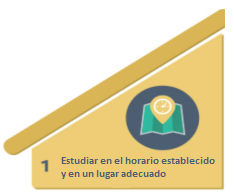
It is advisable to prepare the place where homework will be done. An environment must be created that is different from that used for playing or hanging out. It must have good lighting, tranquility and the necessary comfort. It is also important to establish a daily schedule in which time will be devoted to studying. It is important to consider the most convenient time, without reproducing the school day at home.
You can answer these questions and make the necessary adjustments based on them: Is the place where you do your homework suitable (quiet, temperature, light, work table)? Is there a time of day that you prefer to study?
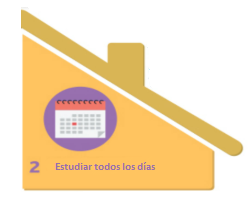 One suggestion is to use part of the time slot they attend school to get in touch with school tasks and proposals. The advantage we have is that we can manage our time without the constraints of a bell or the fulfillment of a fixed schedule of subjects. However, it is important that we can be involved daily with our school activities, taking advantage of the flexibility that the schedule currently has at home.
One suggestion is to use part of the time slot they attend school to get in touch with school tasks and proposals. The advantage we have is that we can manage our time without the constraints of a bell or the fulfillment of a fixed schedule of subjects. However, it is important that we can be involved daily with our school activities, taking advantage of the flexibility that the schedule currently has at home.
Perhaps, for the little ones in the house, there could be a weekly grid where they can do a tick every day and thus create the habit of dedicating time to school every day.
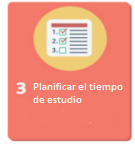 Before starting, it is essential to organize and classify the tasks to be carried out or the study. In this way, the necessary times, materials and resources can be foreseen and, at the end, the established plan can be reviewed.
Before starting, it is essential to organize and classify the tasks to be carried out or the study. In this way, the necessary times, materials and resources can be foreseen and, at the end, the established plan can be reviewed.
You can answer these questions and make the necessary adjustments based on them: Was the planned time enough to complete the task? Did it take me more or less time than expected? Did I manage to complete what was asked of me? Can I improve the distribution of time? What changes could I introduce to improve it?
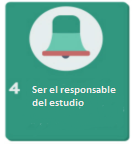 This point refers to the progressive capacity of children and adolescents to take charge of their learning process. This can be observed if they carry out the task at the request of their parents or if they are willing to do it alone, if they look for their own spaces and ways to solve the difficulties they encounter in their development or if they tend to ask questions about their execution. This does not mean that they do not require monitoring and/or the attention of the adult and company to be able to do the exercises. In any case, it is important to consider that the tasks sent are designed so that they can be solved with a high degree of autonomy.
This point refers to the progressive capacity of children and adolescents to take charge of their learning process. This can be observed if they carry out the task at the request of their parents or if they are willing to do it alone, if they look for their own spaces and ways to solve the difficulties they encounter in their development or if they tend to ask questions about their execution. This does not mean that they do not require monitoring and/or the attention of the adult and company to be able to do the exercises. In any case, it is important to consider that the tasks sent are designed so that they can be solved with a high degree of autonomy.
Some questions that could benefit the progressive acquisition of autonomy are: Did you make sure you learned the subject well? Did you have all the materials you needed before starting the task? Did you organize the materials you used? Did you think about the activities for the next class?
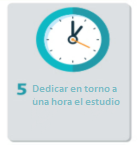 It is recommended that the activities proposed by the school be assigned a specific time during the daily schedule, as we mentioned above. This helps develop a work habit that will allow them to sustain the courses progressively. In this sense, study time is also integrated with other daily life habits that are important for our general well-being.
It is recommended that the activities proposed by the school be assigned a specific time during the daily schedule, as we mentioned above. This helps develop a work habit that will allow them to sustain the courses progressively. In this sense, study time is also integrated with other daily life habits that are important for our general well-being.
Some suggestions: not having items nearby that could distract or make it difficult to complete the task, using some strategy that helps improve concentration on the task, if we notice that they are not well (tiredness, worry, sadness, anxiety, etc.) it is preferable to approach them and talk to them to find out how we can help them.
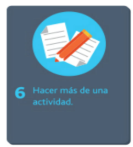 In general, children will be receiving different school proposals to do at home. Especially in these first days of adaptation that we are going through, it may be necessary to sit down with them to organize and plan their “homework agenda”: assign an order, a time for resolution, associated materials, etc.
In general, children will be receiving different school proposals to do at home. Especially in these first days of adaptation that we are going through, it may be necessary to sit down with them to organize and plan their “homework agenda”: assign an order, a time for resolution, associated materials, etc.
To build bridges and help them, we suggest the following questions: Where are you going to start? Which task are you going to continue with? Do you start with what you like or is easier and then go on to what requires more effort? Is it necessary to review previous content? Do you check each completed task to see if it was done well? Older students will be able to answer these other questions and make the necessary adjustments based on them: What strategy are you going to use to solve the task? How are your classmates doing? Did you look up what you didn't know? Did you relate what you were learning to content you have learned? Did you point out your doubts to ask the teacher or professor in the consultation forum?
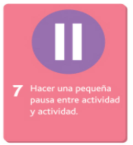 In general, it is not recommended to have work periods of more than 40 to 45 minutes without taking a break or pause. As with other aspects mentioned, this also depends on the age of the children and the school year they are in. However, in any case, breaks or rest periods are necessary, since they help to optimize the mental resources available to undertake these activities.
In general, it is not recommended to have work periods of more than 40 to 45 minutes without taking a break or pause. As with other aspects mentioned, this also depends on the age of the children and the school year they are in. However, in any case, breaks or rest periods are necessary, since they help to optimize the mental resources available to undertake these activities.
Rest is recommended to maintain better performance during the time of the day spent on schoolwork. Therefore, a 10 to 15 minute break is advisable before continuing with work. During these periods, you can choose times of the day to distract yourself and do some other activity not related to school matters.
Some questions that could be asked to monitor its proper use and adjust its effectiveness are: How long did the break last? What did you do during your break? Did you manage to respect the allotted time? Was it difficult to return to school activities? Was the break time too long or too short?
Our intention is not to recreate school at home, but to collaborate with the family environment through education and the resources that we can offer to the children and to you as parents.
Although it may be difficult for all members of the family, we hope that tiredness, fear, the organisation of the weekly dynamics and speculation on the family economy will not take over us. Let's use this tool for the kids as an escape from this reality that invades us, and that we have no choice but to adapt and reinvent ourselves day by day. Let's take advantage of this opportunity to learn from the little ones in the house, perhaps, it will even be an opportunity to rediscover ourselves in some aspect, both personally and as a family.
We hope to have been able to contribute to the reflection and practice. We remain at your service to support you.
Ps. Ma. Noel Gonzalez
Pgga. Maria Panario
Pgga. Martina Silva
If you wish to learn more about the topic or use other similar tools to apply at home, you can consult the following links:
→ How to organize your study time in five steps
→ 5 tips for studying from home
→ 10 Reasons Why I Decided to Homeschool
→ Homeschooling Tips for Beginners
→ How 'regular school' parents can homeschool their kids
→ Homeschooling Teaching Strategies
→ What is the 'homeschooling'? How is it done?
In the coming days, the Department will continue to provide guidance material.
In any case, if you have any specific questions that we –as technicians– can help you with on this or other issues, do not hesitate to write to us at
[email protected] and we will gladly get in touch.